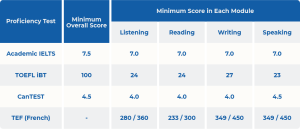
In our ‘How to Become a Dentist in Canada’ blog post, we reviewed the pathways that international dentists can take to become accredited in Canada. Here, we will look at the language proficiency requirements for licensure.
You do not need proof of language proficiency if you have graduated from:
A) A dentistry educational program accredited by:
B) An accredited two-year qualifying or degree completion program in dentistry. As of November 2021, these programs are offered by the University of Alberta, University of Saskatchewan, University of Manitoba, Western University, University of Toronto, McGill University, and Dalhousie University. The language requirement for admissions into most of these programs is an Academic IELTS band score of 6.5 overall with a minimum of 6.0 in each module. French-language programs can be done at Université de Montréal and Université Laval.
However, you need to show proof of language proficiency in the Province of Ontario if you do not fulfil the above conditions. Other provinces and territories do not currently have this requirement, but if you decide to move to (and practice in) Ontario, the Royal College of Dental Surgeons of Ontario (RCDSO) is authorized to ask for proof of language proficiency. This proof can be provided in one of these three ways:
1. Through demonstrating that you have completed a non-accredited dental program taught fully in English or French by providing:
2. Take an English/French Language proficiency test. Keep in mind that test results are valid for two years, so you will need to take a new test if your results are from more than two years prior to your application.
You need to have one of the following scores to qualify:

3. Submit acceptable evidence to the Registrar or Registration Committee that you have reasonable proficiency in English or French. In this case, you will be delivering an oral presentation before a panel and answer any questions they may have regarding the matter. Although this option may work well for those who speak English or French as their first language, it can delay the registration by months as the Registration Committee typically meets only three to four times per year.
It’s important to remember that each NDEB exam, as well as the preparation courses available at Prep Doctors, are administered and delivered in English. Having a reasonable command of English and improving your language skills will help you measure your English proficiency and allow you to take your exams with more confidence and enable you to keep up with the pace of our courses and your future career.
Have a question about IELTS? Our team is always available to answer any questions. Reach out to us through our Facebook page or email us at info@prepdoctors.ca. We are more than happy to help!